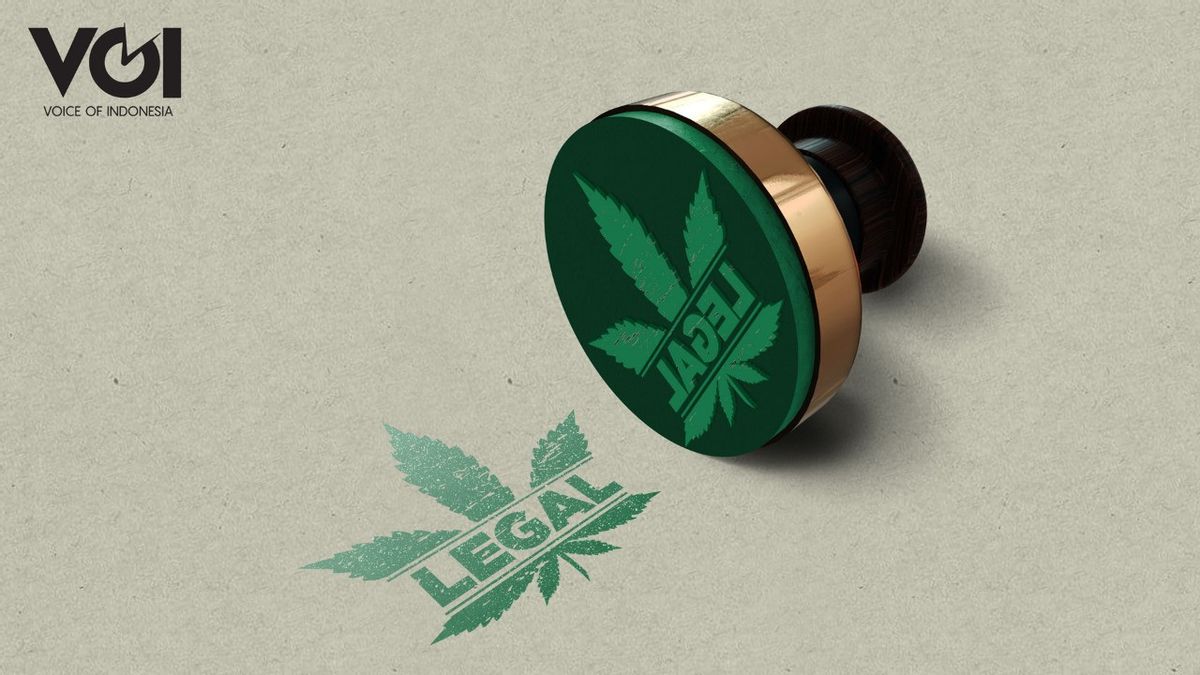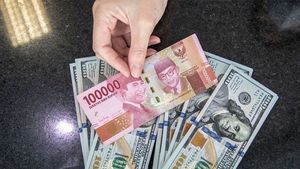Rafli Kande is the first legislator to come up with the idea of using marijuana. He even sparked the idea in the official government forum. As discussed in "The Silent Politics of Senandung Rafli Kande", the idea of the Acehnese artist is actually progress in the effort to empower marijuana for the sake of the country. Part of VOI's signature Series, "Don't Panic It's Organic". This article will discuss the long road of efforts to exploit marijuana around the world and how hard it is to push for an entry called legalization in Indonesia.
This article was written after reading the official statement of the National Narcotics Agency (BNN) regarding the use of marijuana as an export commodity. Head of the National Narcotics Agency (BNN) Heru Winarko stated that his agency strongly rejects this idea. The reason is, marijuana cannot be used, cultivated, or used for anything. Including treatment.
The National Narcotics Agency argued that marijuana users dominated 63 percent of the number of narcotics abusers. This statement raises the question of the extent to which BNN understands the idea of exporting cannabis or the concept of legalization that has long been promoted in the struggle of a number of parties. It is nothing. What we understand is that the use of marijuana does not mean that everyone is free to "kiss" at will. Maybe we're just being paranoid.
"Our step in the source of marijuana is to take precautions, for example by replanting cannabis fields with corn and coffee on an area of twelve thousand hectares," Heru said, Friday, January 31.
In fact, in simple logic, legalizing marijuana is the most sensible way to transfer the power of marijuana from the black market to the hands of the state. With legalization, the government will have the power to regulate the distribution and use of marijuana. In general, there are three forms of legalization that countries have adapted to the world: medical, non-medical (recreational or textile), and full legalization --including medical and non-medical.
For the use of medical marijuana, we can reflect on several countries. Chile, for example, has since 2014 legalized the cultivation of medical cannabis. A year later, drugs derived from cannabis began to be bought and sold by prescription at local pharmacies.
Peru is the same. The country in southern Chile has legalized the production, sale and use of medical marijuana. Through a law, the congress also opened up imports for cannabis oil. Another Latin American country, Argentina has also allowed medical marijuana. If there is a country that is most developed about the use of marijuana in the Americas, it is Uruguay.
Learn to regulateSince July 2017 Uruguay has officially become the first country in the world to fully legalize marijuana. In Uruguay, marijuana consumption is shrouded in various standard rules regarding who and how the consumption of marijuana is legally permitted. There, marijuana users must legally register with the government. Even when buying marijuana.
Everyone should do a fingerprint scan. This is done to control the amount of quota for marijuana purchases by individuals. The figure set by the Uruguayan government is 40 grams per month. Eduardo Blasina, founder of the Montevideo Cannabis Museum, called this a step forward as well as a big responsibility for the country.
However, there was no other choice. Apart from income cases, legalizing marijuana is a way for the government to suppress the domination of drug cartels and mafia in the black market. "The big responsibility we have in Uruguay is to show the world that this system of freedom with rules works better than prohibitions," Eduardo was quoted as saying by the New York Times.
After Uruguay, Canada is the next country to fully legalize marijuana. The country with the maple leaf flag is the most advanced European country regarding the use of the cannabis plant. Canada is even the largest legal marijuana market in the world. However, as in Uruguay. The use of marijuana in Canada is also not arbitrary. This is perhaps what the National Narcotics Agency and the general public who are still paranoid need to know about the word legalizing marijuana.
In Canada, the consumption of marijuana is regulated under super-strict terms. Everything is contained in The Cannabis Act, a law book that contains various regulations on the use of marijuana in ten provinces and three territories in Canada. Quoted from Beritagar.id, the government limits the purchase of marijuana by concentrating it in the Ontario area. Purchases can only be made online.
In fact, in the Yukon region, the regulation of marijuana use is stricter, where only people over the age of 18 have the right to own marijuana. Consumption can only be done in private residences. In Ontario and Quebec, the authorities decided to increase the minimum age to 19 and 21 years.
Apart from area and age, the government has also set a maximum limit for purchasing cannabis at 30 grams. Another affirmation of the strictness of the rules is the part of the cannabis plant that is traded. For transactions aimed at planting, the government only allows sales of the flowers (buds), oil and marijuana seeds.
And as illegal as marijuana use is in Canada, it is a driving ban for those currently under the influence. This is an important point of view about the importance of public awareness about marijuana. That legalization by the government is not enough without understanding and awareness of the public about marijuana, its effects, and the concept of legalization.
How about in Indonesia?Dhira Narayana, Chairperson of the Indonesian Cannabis Circle (LGN) described the tough struggle to utilize marijuana. It is unfortunate for Dhira, because in fact Indonesia is a country that has enormous cannabis resources. Not only the quantity of natural resources (SDA), Indonesian people actually have a long history and culture of using cannabis.
In Aceh, for example. In the Tajul Muluk book compiled by Acehnese cultural observer, Tarmizi Abdul Hamid, the Acehnese people use marijuana as medicine. Apart from Aceh, a document in Maluku in the 1600s also found records about the use of cannabis in the archipelago. The note was picked up by Georg Eberhard Rumphius in his book, Herbarium Amboinense.
"If we talk about marijuana nowadays, without any data, it's better not to talk. Don't be like BNN, there is no playing data just by the way. In 1741 it was in a book entitled Herbarium Book, by Georg Eberhard Rumphius," said Dhira to VOI, Friday, February 7th.
In the book, Eberhard Rumphius explains some of the properties of the cannabis plant, including its habitat and character and benefits for both men and women. "It is at least from the two notes that we can see and be able to refute the government's argument that marijuana cultivation is used for illicit trade and it has been proven that long before marijuana has existed in Indonesia, it has not damaged our nation," said Dhira.
The Dhira movement with LGN has been in action since 2010. All library research and cultural observations are carried out by a non-profit organization whose struggle is to focus on the use of the cannabis plant. Regarding the cannabis export discourse put forward by Rafli Kande, Dhira said this was a form of stakeholder forward thinking. However, of course, it takes strategic steps to carry it out.
"Exports are in the form of finished goods. Now, to export finished goods, we actually need the cannabis plant in Aceh. It must be managed. To manage this clearly requires a strategy, if we want to provide foreign exchange for the country," said Dhira.
Dhira did not mention the exact steps the government could take in exporting cannabis. What is clear, it takes a preliminary step, namely research that can be used as a reference for determining an export strategy. Unfortunately, in Indonesia, research cases have become cases. This country is in fact not only against the abuse of marijuana, but also against research and development of science about marijuana.
"If it is related to research, there has not been any progress related to medicine to this day. But because we make something, it turns out that it requires strong effort and political will. So we are not prioritizing it for the time being. But we are prioritizing to do research on how the regulatory system for plant utilization marijuana in Indonesia.
Next Article: The Origin of the Narcotics Law in Indonesia and the Myriad Problems Behind It
The English, Chinese, Japanese, Arabic, and French versions are automatically generated by the AI. So there may still be inaccuracies in translating, please always see Indonesian as our main language. (system supported by DigitalSiber.id)













